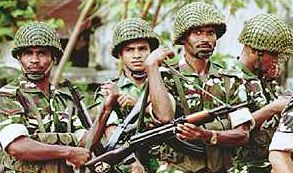United Nations votes to send peacekeepers to South Sudan
By NICK WADHAMS, Associated Press Writer
UNITED NATIONS, Mar 25, 2005 (AP) — The U.N. Security Council voted to send 10,700 peacekeepers to Sudan to monitor a peace deal ending a 21-year-civil war, but left contentious issues of sanctions and how best to punish war criminals in the Darfur region for later debate.
 The unanimous vote on the U.S. backed resolution creating the United Nations’ 17th active peacekeeping mission is the first significant Security Council action on Sudan since a U.N.-backed panel declared in late January that crimes against humanity — but not genocide — occurred in Darfur.
The unanimous vote on the U.S. backed resolution creating the United Nations’ 17th active peacekeeping mission is the first significant Security Council action on Sudan since a U.N.-backed panel declared in late January that crimes against humanity — but not genocide — occurred in Darfur.
The peace deal that the new force will monitor is not connected to Darfur. But the council hopes the move will help bring about an end to the violence in Darfur, where the number of dead from a conflict between government-backed militias and rebels is now estimated at 180,000.
“We remain very concerned and disturbed by the situation in Darfur,” Deputy U.S. Ambassador Stuart Holliday said. “And we will continue working with our council colleagues to address that important question in the days ahead.”
The U.S.-backed resolution asks that the new mission work with an African Union peace mission in Sudan “with a view toward expeditiously reinforcing the effort to foster peace in Darfur.”
While the vote will help quell criticism of council inaction over Darfur, the document purposely does not address key issues that would more directly influence that conflict: how to hold war crimes suspects from Darfur accountable, and whether to impose new sanctions on the country.
Several members of the council want the cases referred to the International Criminal Court, a body that the United States opposes. China and Russia are the chief opponents of sanctions.
Early on, the council had hoped to deal with all those issues in one resolution. But because agreement couldn’t be reached, the United States decided to split the issues into three resolutions and deal with the other two issues later on.
However, after the Americans presented their resolution on peacekeepers Wednesday, France put forward it’s own resolution that would prosecute Sudanese war crimes suspects before the International Criminal Court.
France and several other members of the council had always demanded that all the issues be dealt with at once, not piecemeal as the United States proposes.
The French move would force the United States to choose between accepting a body it opposes or casting a politically damaging veto.
That’s because it was the United States itself that had demanded swift action last year after declaring that genocide has occurred in Darfur, and does not want to appear to be holding up the process.
Early Thursday, however, France’s U.N. Ambassador Jean-Marc de la Sabliere said he decided not to seek a vote this week on his resolution because “some delegations” wanted more time to consider it, and it would probably be submitted next week.
The United States has repeatedly says it opposes the ICC, but has not said directly if it will veto.
It’s not clear how much the continued U.S. opposition influenced France’s decision. Several other diplomats said they had not had time to receive instruction from their capitals on how to vote because of the Easter holiday.
After the vote on peacekeepers late Thursday, de la Sabliere remained adamant that the Sudan cases must go to the International Criminal Court, possibly presaging a new showdown with the Americans.
“It is not possible not to combat impunity, we need to put an end to impunity and the Security Council has to refer the situation in Darfur to the ICC,” de la Sabliere said.
Conflict has engulfed Darfur since February 2003, when two non-Arab rebel groups took up arms against the Arab-dominated government to win more political and economic rights for the region’s African tribes.
